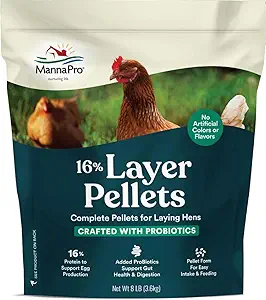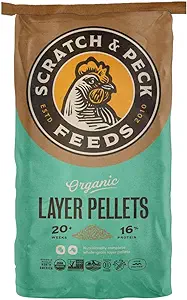Introduction to Winter Chicken Care
The transition from warmer seasons to winter brings about significant challenges for poultry keepers, especially in terms of chicken care. As temperatures drop, chickens experience changes in their nutritional requirements and overall health needs. In winter, the cold weather can affect chickens’ metabolism, making it imperative for poultry owners to adapt their feeding routines to ensure the well-being of their flock.
During these winter months, chickens require a diet that is more calorie-dense to help them maintain their body heat. A suitable chicken feed should provide adequate energy, essential nutrients, and minerals to support their health and bolster their immune systems. The cold stresses their bodies, making it essential to provide feed that can help sustain their energy levels. Additionally, it is important to note that chickens are less active in winter, resulting in decreased egg production. A carefully tailored feeding regimen can mitigate these effects and potentially maintain consistent egg production.
Furthermore, hydration plays a crucial role during winter as well. Chickens tend to drink less water when it is cold, leading to dehydration, which can affect their health and egg-laying capabilities. Providing fresh and unfrozen water is vital, alongside appropriate feed to keep them healthy and productive. Therefore, understanding these winter-specific needs and adjusting the chicken feed accordingly becomes key to effective winter chicken care. In the following sections, we will delve into specific types of chicken feed that are particularly beneficial for maintaining health and egg production during the winter months.
Understanding the Nutritional Needs of Chickens in Winter
As temperatures drop and winter settles in, the nutritional requirements of chickens undergo significant changes. During this season, chickens need a well-balanced diet that supports their health and helps them maintain body temperature amidst the cold. Essential nutrients required for optimal chicken health include protein, fats, and carbohydrates. Each plays a crucial role in ensuring that chickens remain warm, active, and productive during the winter months.
Protein is vital for chickens, especially in winter. It contributes to the development and maintenance of muscle mass and helps in the production of feathers. During cold weather, healthy feathers provide insulation, thereby regulating body temperature. High-quality protein sources such as soybean meal, fish meal, and certain grains can facilitate proper growth and keep chickens well-fed. Ensuring that their feed is rich in protein will support their overall health and aid in sustaining warmth.
Fats are another critical nutrient that becomes increasingly important in winter. Fats not only provide a concentrated source of energy but also play a vital role in maintaining body warmth. Chickens that are adequately fattened are better equipped to withstand cold weather. Including healthy fats in their diet, such as flaxseed oil or fish oil, can enhance their calorific intake. This not only helps in sustaining their energy levels but also boosts their immune system, making them more resilient to winter illnesses.
Finally, carbohydrates are a crucial energy source that chickens benefit from during the winter months. Whole grains, corn, and oats are excellent carbohydrate sources that can help keep their energy levels high. This is particularly important as chickens often become less active and expend less energy during the colder months. A well-rounded diet rich in these essential nutrients will ensure that chickens remain healthy, active, and warm throughout the winter season.
Key Features to Look for in Winter Chicken Feed
When selecting chicken feed for winter, several crucial features must be taken into account to ensure the health and well-being of your flock during the colder months. One of the most important factors is the calorie content of the feed. Chickens require more energy in winter to maintain their body temperature and overall vitality. Therefore, high-calorie feeds are essential, as they provide the necessary energy to help chickens cope with colder weather.
In addition to calorie content, it is imperative to look for supplements that promote the health of your chickens during winter. Vitamins and minerals play a critical role in strengthening the immune system and supporting overall wellness. Consider feeds enriched with vitamin E, selenium, and calcium, as these nutrients facilitate optimal egg production and enhance the overall condition of the birds.
Another key aspect to consider when choosing winter chicken feed is the quality of the ingredients. High-quality feed should contain a balanced mix of proteins, fats, and carbohydrates. Look for feeds that are primarily composed of whole grains, seeds, and natural supplements rather than fillers and artificial additives. The use of whole ingredients ensures your flock receives essential nutrients necessary for their health during winter.
It is also beneficial to pay attention to grain particles’ size and texture in winter chicken feed. Smaller, finely ground particles can be easier for chickens to consume, requiring less energy during cold weather. Additionally, ensuring that the feed is formulated specifically for winter conditions can significantly impact your chickens’ performance and health.
Overall, focusing on these key features when selecting chicken feed for winter will ensure that your flock thrives despite the challenges posed by the season. Careful consideration of calorie content, health supplements, ingredient quality, and feed texture will position your chickens for optimal health throughout the winter months.
Top 4 Best Chicken Feeds for Winter
Finding the right chicken feed during the winter months is crucial to ensure your flock remains healthy and productive. Here are five of the best options specifically formulated for winter feeding, providing your chickens with the necessary nutrients to thrive in colder temperatures.
1. Purina Layena Plus Omega-3 – This high-protein feed is ideal for laying hens, enriched with omega-3 fatty acids to boost egg production, especially in winter when natural forage becomes scarce. Its fortified formula helps maintain energy levels while also supporting overall health through enhanced nutrient absorption.

2. Nutrena NatureWise Layer Pellets – Designed for winter, these pellets provide all the essential nutrients your hens need, including vitamins and minerals crucial for egg-laying. NatureWise Layer Pellets are known for their higher protein content, which is essential during colder months when hens require extra energy to maintain body temperature.

3. Manna Pro Organic Layer Pellets – For those seeking an organic alternative, Manna Pro offers pellets that are free from artificial additives. These organic pellets contain a blend of wholesome ingredients that provide balanced nutrition, promoting healthy laying even amidst the challenges of cold weather.

4. Scratch and Peck Feeds Organic Layer Formula – Another organic feed, this option is rich in nutrients derived from non-GMO grains. Scratch and Peck Feeds emphasize whole ingredients, ensuring your chickens receive a balanced diet that is both nutritious and easy to digest, making it particularly suitable for winter feed.

Conclusion: Ensuring a Healthy Winter for Your Chickens
Choosing the right chicken feed during the winter months is crucial to maintaining the health and productivity of your flock. As temperatures drop, chickens require a diet that not only supports their nutritional needs but also bolsters their immune systems to withstand the stressors associated with cold weather. Throughout this blog post, we have discussed the top five chicken feed options specifically formulated for winter, emphasizing their enhanced nutrient profiles tailored for the colder season.
First, it is important to recognize the significance of a high-energy and protein-rich feed, which can help combat the energy deficits chickens experience in winter. Feed that includes grains, seeds, and other protein sources will ensure that chickens have an adequate caloric intake, allowing them to generate body heat and maintain proper physiological functions. Additionally, incorporating supplements and fortified feeds can further enhance the overall health of your chickens during this challenging season.
Moreover, keeping fresh water accessible is just as critical as feeding. Chicken feed can become less effective if the birds do not hydrate properly. Thus, providing heated water sources can prevent freezing and encourage the birds to drink enough fluids, which, in turn, assists with digestion and general well-being.
As we have outlined, selecting the appropriate chicken feed involves careful consideration of not just the ingredients, but also the specific needs of your flock during winter. By implementing a well-rounded feeding strategy that takes into account these essential points, you can ensure that your chickens remain healthy and continue to produce eggs, even in the harshest conditions. Ultimately, proactive feeding practices will contribute to the resilience of your flock, keeping them robust and thriving all winter long.
